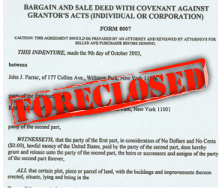
Nationwide foreclosure activity may be en route to a slowdown, according to RealtyTrac’s April foreclosure market report, but it’s going to be a rough road getting there (see full report below).
Overall foreclosure filings, including default notices, scheduled auctions and bank repossessions, otherwise known as “REOs” or real estate owned properties, have declined 9 percent from March and 2 percent from April 2009.
The number of default notices filed throughout the country decreased 12 percent over the previous month and 27 percent compared to April 2009, the report, released today, shows.
But the residual effects from the foreclosure crisis last year are still being felt with the number of bank repossessions jumping 45 percent from April 2009, according to the report. This rate of repossessions was the highest monthly showing that RealtyTrac has recorded since the company started tracking data in January 2005, by sheer number.
Daren Blomquist, a spokesperson for RealtyTrac, said that the prognosis is not completely linear.
“This decline in new filings, in my mind, is a pretty big sign post that we’re headed in the right direction,” Blomquist said. “[But] the record REOs are a warning that it’s going to be a rough road.”
Blomquist said that high unemployment and the number of underwater homeowners is having a negative influence on foreclosure activity. And, despite the decline in the rate of new foreclosure filings, a full recovery could take a while.
“Our best guess… is that it’s going to be 2012 or 2013 before we see any kind of market balance returned,” nationwide Blomquist said.
The report also shows, however, that the foreclosure activity was largely localized to a handful of states. Five states — Florida, California, Michigan, Illinois and Nevada — account for 50 percent of the total foreclosure filings issued nationwide, according to the report. In last month’s RealtyTrac report those states also ranked among the worst in terms of foreclosure filings, when they and five other states comprised 70 percent of the foreclosure activity nationwide. Florida, Nevada and California marked the top three foreclosure states in April 2009, as well.
In the New York City market, however, foreclosures have not been as big a problem, although some markets have been hit harder than others, like Queens, which has been dubbed the new “foreclosure battleground” for New York City, where some neighborhoods saw a 64 percent uptick in the number of foreclosure filings in 2009.
“New York so far has avoided the brunt of the foreclosure problems,” Blomquist said, noting that the rate of foreclosure activity has dropped 21 percent year-over-year in the five boroughs.
“I’m not seeing any surge in foreclosures that’s affecting [the market] in any meaningful way,” said Noah Rosenblatt, founder of UrbanDigs, a brokerage and research group.
Manhattan, in particular, is showing sustainability in the residential market, Rosenblatt said.
Appraiser Jonathan Miller, head of Miller Samuel, said that New York City foreclosure activity pales in comparison to the rest of the nation because “we did not see as an entire market the level of speculation that was so rampant… in the ‘sand states,'” including Florida, Nevada and California.
Also helping New York is the preponderance of co-op units — which comprise 75 percent of owner-occupied housing stock in the city. Co-op boards are often more critical of an applicant’s financial background, Miller said, resulting in a lower rate of default among co-op owners, compared to condo and single-family home owners.
Even so, New York City is not without its Achilles’ heel, according to Miller. The longer that the region continues to have an unemployment rate that “hovers around 10 percent” the more likely it is that foreclosure activity could rise, Miller said.
“I’m not sure it’s time to celebrate,” Miller said of the RealtyTrac data. “If we’re reaching a plateau, how long is that plateau?”